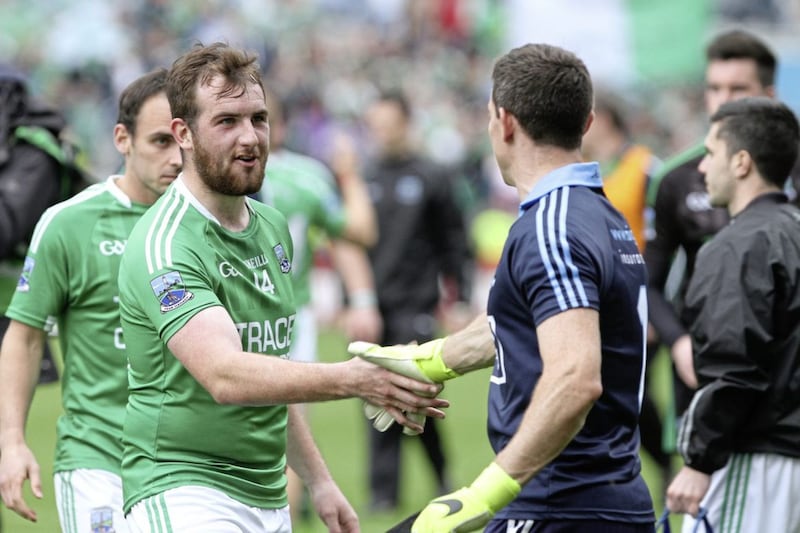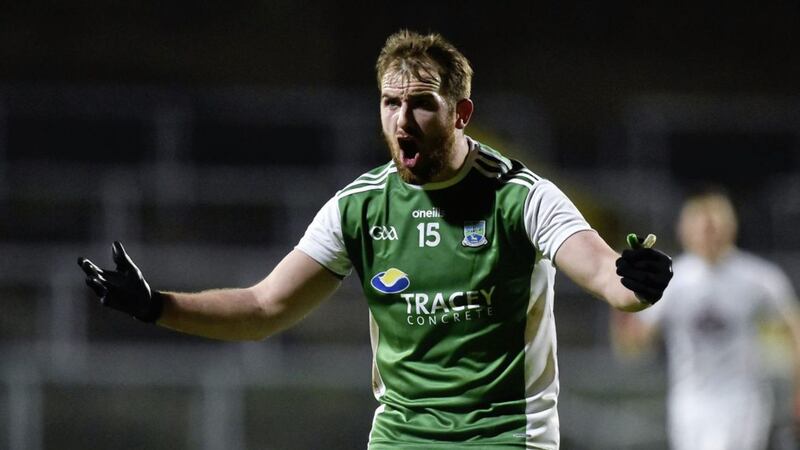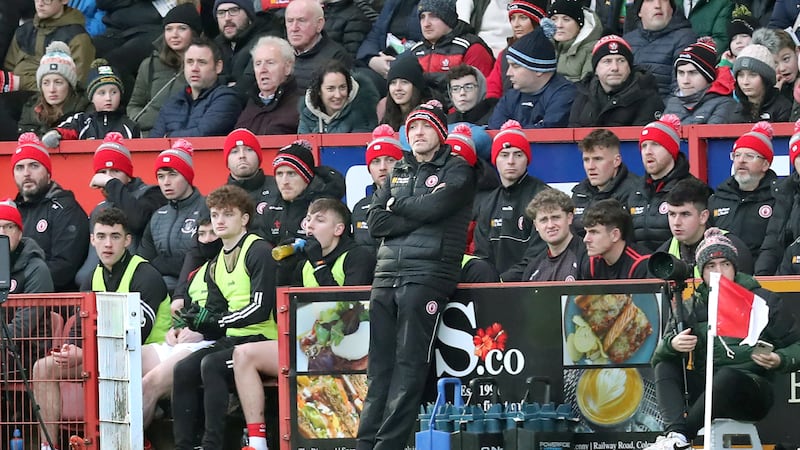THERE’S a saying that a work of art doesn’t exist outside the perception of the audience.
Before you read any further, answer this: what’s your perception of Sean Quigley?
He’s not deaf to opinions, nor does he care to be.
“People can take me whatever way they take me” is literally the very first thing he says into the tape.
What you see is what you get, but it’s not always what you expect.
Audiences have been sometimes blinded to his artistry by the stereotypes that have stuck to him, some about his weight, others about his attitude and nothing moreso than the infamous pizza story that you’re almost loathe to bring up again.
What does he think the stereotypical view is himself?
“I don’t know… Probably as someone that doesn’t take things seriously or does things off the cuff, bluffs about, doesn’t go to training the odd time or takes it as it goes.
“That’s fair enough, I would never say to someone they’re not entitled to their opinion.
“The way I’d look at it, if I wasn’t serious about this game we’re in, I wouldn’t be sitting here talking to you. I wouldn’t be going into my 11th or 12th summer playing inter-county football.
“People can read stuff like that pizza article and say ‘that boy’s a quare joker, he loves the craic’. And I do. We all want a good time.
“You’re trying to be a serious county footballer and it keeps coming up.
“It’s a silly bit of craic and all but it gets a bit boring after a while.
“Now, I probably wouldn’t do it. That’s not to say if I did, it wouldn’t cost me a thought.
“But don’t make a mistake in thinking I don’t take this seriously.”
Towards the end of the two hours upstairs in a homely Aughnacloy coffee shop, you bring up the potential of a meeting with Padraig Hampsey and the contrast people will draw between the gym owner from Tyrone and the Fermanagh man with no love for it at all.
“Realistically, do I want to be judged for kicking 1-5 against Laois in Brewster Park two months ago when nobody will remember it, or do I want to be judged in the white heat of championship battle in Brewster Park against the All-Ireland champions?
“Paudie Hampsey’s a prolific defender, they all are. But if I see Paudie Hampsey coming to mark me, I’m not gonna go ‘here, I’m away, I’m not marking that boy, can they put someone else on me?’
“I’m probably looking through green tinted glasses but Jonny Cassidy, in my opinion, is one of the best defenders in Ulster. He’s as good as any of them Tyrone lads, in my honest opinion.
“No disrespect but if you were sitting down with Darren McCurry today, would you have asked him about marking Jonny Cassidy?”
And therein lies the beauty of Sean Quigley. The topics bounce back and forth. He holds his own, bites down on a few criticisms.
But he’s just himself. Just a man drinking a coffee, eating a scone, talking about football without fearing his own words. No airs, no graces, no highfaluting language.
He absolutely loves football, yet admits that “70 per cent of the time, I am probably dreading, hating the thought of going to training.”
Hasn’t had a lightbulb moment in terms of his physical conditioning but even if he’ll never truly love it, he’s at least found acceptance to the necessity of going to the gym or out for a 10k run.
The idea of a packed Brewster Park this evening fills up his soul. That’s what he does it all for.
He would love nothing more than to spring a surprise on the All-Ireland champions tonight.
If things go south, it’ll hurt surely. But it won’t eat him up.
Win or lose, the sun will still rise in Roslea tomorrow.
* * * * * * *
SEAN is the youngest of three boys from a houseful of six.
Whereas the three male siblings have all lined out for their county, the three girls have absolutely zero interest in football.
He lives in the home house in Finn Park, with all five of his siblings within a stone’s throw, dotted around the village of Roslea.
Four families from the small housing estate - the Quigleys, Cosgroves, Cassidys and McGuinness’s - provided ten boys to the club that helped them win four out of five senior Fermanagh titles between 2010 and 2014.
Sean Quigley was the youngest of the troop.
“We spent our days literally banging a ball against a wall and beating the shite out of each other to get it.
“We would have played anything. If Wimbledon was on, we’d go down to the school, there’d be tennis courts and we’d play tennis all day.
“If there was rugby on, we’d get a rugby ball and we’d play rugby. It was never just Gaelic. Whatever was on the television, we’d go out and try and replicate it.”
That was less about Gaelic football and more about the normality of a late-1990s Irish childhood.
The norm around Roslea now is different, and no different from anywhere else. Young lads are still around the club the whole time, but they spend their free hours inside curling dumbbells.
“I was reading an article recently there with Paddy Keenan from Louth about the amount of county footballers now that can’t use both feet. It’s crazy.
“Maybe not in the higher end county squads but if you go into most, they can’t kick the ball 30 yards with both feet, but they’re in benching God knows what in the gym.
“I sound ancient here talking, but you go down to Roslea, there’s a couple of wee lads are great footballers, around 15 or 16, and they’re in the gym.
“That’s brilliant, and it’s the same in every club, but my thinking would be take a bag of balls out on to the pitch, use your bad foot and kick the ball to each other instead of being inside lifting weights. That’s just my opinion.”
Quigley has always been beyond his years. He’s just 29, won’t be 30 until August, but he’s been around for so long you’d take him for well beyond that.
It’s eleven seasons since he made his Fermanagh debut as a schoolboy.
St Michael’s Enniskillen had lost their MacRory Cup semi-final to Dungannon on the Friday night. The following day, the call arrived to the house. A message was left to tell Sean to come to the match in Carrick-on-Shannon along with Conor.
The world had just fallen in around John O’Neill’s feet with a host of senior stars walking out the door mid-season.
They got on the bus in Lisnaskea, came off the bench in Leitrim, and walked off feeling the mixed emotion of a losing debut.
A week later, they played Kilkenny down the country. He recalls there being four Fermanagh supporters at it. Anybody there from Kilkenny was watching the U16 hurling match on the other pitch.

In the decade since, fortunes have fluctuated wildly. From Division Four to a win away from the top flight; from championship maulings to big days in Clones, Croke Park and Omagh.
Yet his own career has run along something much closer to a straight line. His 4-28 in this year’s Division Three campaign has garnered some attention but that’s kind of just what he does.
The 1-8 he kicked and pushed his way to against Dublin and the outmatched Rory O’Carroll in the famous 2015 All-Ireland quarter-final topped up a summer tally of 3-36 that made him the championship’s top scorer that year, beating off Cillian O’Connor and Bernard Brogan.
There have, as he says himself, been more bad days than good. But while the Rory Gallagher reign completely altered Fermanagh’s psyche for a while, it would be to those high points under McGrath that Quigley would return first if he had the chance.
“I was playing probably the best football I played for Fermanagh and I was in bad shape.
“If I was to go back, I’d love to go back to that stage of my career, 24, 25, 26, where I was really confident, didn’t matter who we were playing I was on it, but unfortunately I wasn’t in the best physical condition that I could have optimised my own performance.”
For all of the early part of his career, when Fermanagh’s season ended, he just switched off completely.
He describes the condition he’d have returned for pre-season in as “horrendous.”
“But it didn’t bother me. It didn’t,” he says.
“When Fermanagh was over, say we were knocked out of the qualifiers, I wasn’t sitting the following week thinking I better start topping up on my fitness here because we’re going back now in three months. That was three months for me to go on holiday…”
It never affected his performances for Roslea, because Fermanagh club football has long danced to Sean Quigley’s tune. Roslea might be going on eight years since their last championship but their talisman remains virtually untouchable.
The only regret he has is never taking up any of the annual offers to go and play football in America for a summer. The calls came mostly when the clubs were kingpins locally and had grand ambitions of Ulster.
There have been a few high-profile defections from various counties in recent weeks heading that way, and Quigley is in no doubt as to what he’d tell any young Fermanagh footballer who came to him with the question.
“If I was going back six or seven years ago, I’d be gone. Without a shadow of a doubt.
“Even Fermanagh lads and you’re trying to keep them here, there will be boys who’ll be saying to them ‘there’s nothing out there, stay here’. I’ve told some of the lads, go, life’s too short to be missing out on stuff like that.”
Out of the shadows of Conor and Seamus, he’s emerged to become his own man and write a place in the county’s history not just above his elder siblings, but most others.
And yet in that big bad world of perceptions, there are people out there who would argue he wasted his ability by not being the shape he might have been.
“People will say ‘c’mere, if that man had been in better condition, he could have done so much more’.
“I wouldn’t think to myself that I’ve wasted my county career because I’ve enjoyed the most of it. It’s hard to say whether I’d go back and change any of it.
“We’d all love to be in great condition 24 hours a day, 365 days of the year. But I honestly dunno. I wouldn’t like to say that I wasted some of my career.
“I haven’t got up one morning and said ‘right, I’ve three or four years left here of county football, I’m gonna get myself into shape to make up for the years I wasn’t in shape’.
“I’m not saying I’m in brilliant shape at the minute but I’m in better shape than what I was. It wasn’t a lightbulb moment for me to say that I’d make up for lost time – I didn’t lose any time.
“I mightn’t have been in great shape but I was competing at a high level and putting up big scores at a high level consistently.
“I like to think I’ve been pretty consistent every year I’ve played for Fermanagh, regardless of what condition I’ve been in.
“So naw, I wouldn’t say I wasted any time, to tell you the truth.”
* * * * * * *
IT would be wrong to say anything so deep and meaningful as Rory Gallagher changed his outlook on football or life. He didn’t.
It was just that Sean Quigley wanted to play for Fermanagh, and the standards demanded by the green jersey over those three years were higher.
“There’s no point lying, the first three months were absolute hell. I mean it was brutal. Seven days a week.
“I was getting up at 5am to go to Ryan McCluskey’s gym in Enniskillen, going to work, into the car, straight back to training – dogging. Pure dogging.”
The five minutes of extra work he might have been accustomed to at the end of a training session became 35 minutes.
Yet it was the brother, Seamus, who had finally put his own shoulder to the wheel and was leading the line. Sean started just one league game in Gallagher’s first year.
“Then I was dropped the following week. Rory wanted a specific type of player. I got myself into shape but I probably wasn’t doing what he wanted me to do.
“I probably had a wee bit of an ego trip that he wanted me to track back and work, where I was probably used to watching the boys around me doing that and kicking over a couple of frees.”
There’s no doubt in his mind when he says Gallagher was “with the greatest respect to any other coach or manager I’ve been involved with, the best that I’ve ever come across – tactically, awareness of other players, and the way he knows football inside out.”
Gallagher’s bluntness carried well in a changing room that might not always have loved it, but was mature enough to recognise they needed it.
Even though he wasn’t playing in the league, Quigley knew he would play in the championship simply because Fermanagh needed his scores.
He did the training because he had to do it. And because he did it, there were big days like an Ulster final and coming within one win of promotion to Division One.
There will never be any great part of him that loves training though. Taking last year out, his first break in a decade, only widened his lens.
“I love playing football, I love matches. If you can find anyone that tells you they love going to training four nights a week, I’d be asking serious questions about them,” he says, not even laughing.
“I know there’s a group of young lads in Fermanagh that live and breathe it. I probably don’t.
“I do enjoy it, don’t get me wrong. But I’d say 70 per cent of the time, I am probably dreading, hating the thought of going to training.”
And yet while his words stand on their own two feet – he’s big enough not to care how they read – his demeanour makes you conscious of portraying him as a man feeling unduly burdened by county football.
It might feel that way when he’s leaving Mannok on a Tuesday or Thursday evening and driving across to Lissan.
If it’s a Friday evening, it definitely feels like a burden, because there’s nothing on God’s green earth he hates more than training being switched to a Friday night.
And he does feel that a lot of people take county footballers for granted, that they’re duty-bound to play if they have the talent for it.
He loves playing for Fermanagh, loves playing for Roslea. Coming 30, in his soul he’s still the youngest boy in Finn Park fighting his elders for a touch of the ball coming down off the gable wall.
But it’s all a game, and a game has its place.
“Ach sure c’mere, people say they’ve no regrets, this, that and the other. No matter what you do, you’re gonna regret stuff.
“I regret five or six years ago I wasn’t in the condition I should have been in to be a county footballer. But that’s just to be a county footballer, that’s nothing else, which on the scale of things…
“Being in condition to be a county footballer, nowadays for 90 per cent of county footballers, that is their main priority. No matter what age I was, that was never my main priority.
“That was probably my downfall when it came to playing county football, but it was probably my biggest strength as well.
“You definitely have regrets, too many of them to name, but I’m not sitting in the house thinking them about all the time.”
The present has perceived Sean Quigley too harshly. Judged him on what he might have been rather than what he is, the two of which he’d argue aren’t that far apart.
When his career becomes past tense in however many years’ time, history might just come to alter the audience’s perception, and his art might fully be appreciated.







